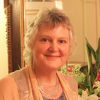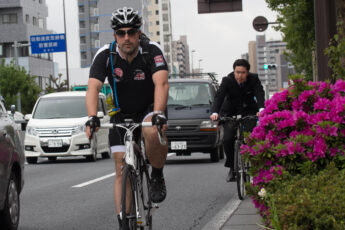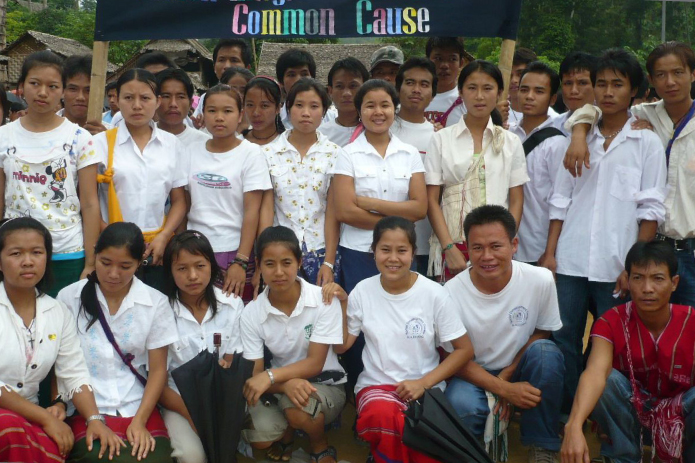When I joined Refugee Empowerment International (REI), until 2020 known as Refugees International Japan, the priority was to visit refugee communities to understand the situation. What is it like living without an identity and with limited freedom? I was able to visit communities who lacked the ability to move about freely.
People forced from their homes and then confined to a life without choices that we take for granted. I wanted to understand how people managed to live under such circumstances.
Making a home away from home
Travelling to refugee projects is no easy task, as most are located in isolated areas, far from the general population. They are always described as “temporary encampments” even after 30 or 40 years.
The first refugee camp I visited was Kakuma in the north of Kenya, near the border with South Sudan (at the time part of Sudan). First we had to fly to the town of Lokichoggio, and from there we had an armed escort to the camp because of the danger posed by bandits.
The camp was in the middle of nowhere and yet, somehow, the residents had built up an active, bustling community. You will see this in most camps, where people establish their own economy, their own culture: there were restaurants, bars, hair salons, entertainment centres and small shops everywhere. People have lost so much, yet life must go on. People need normality and they need a sense of purpose—a sense of identity.
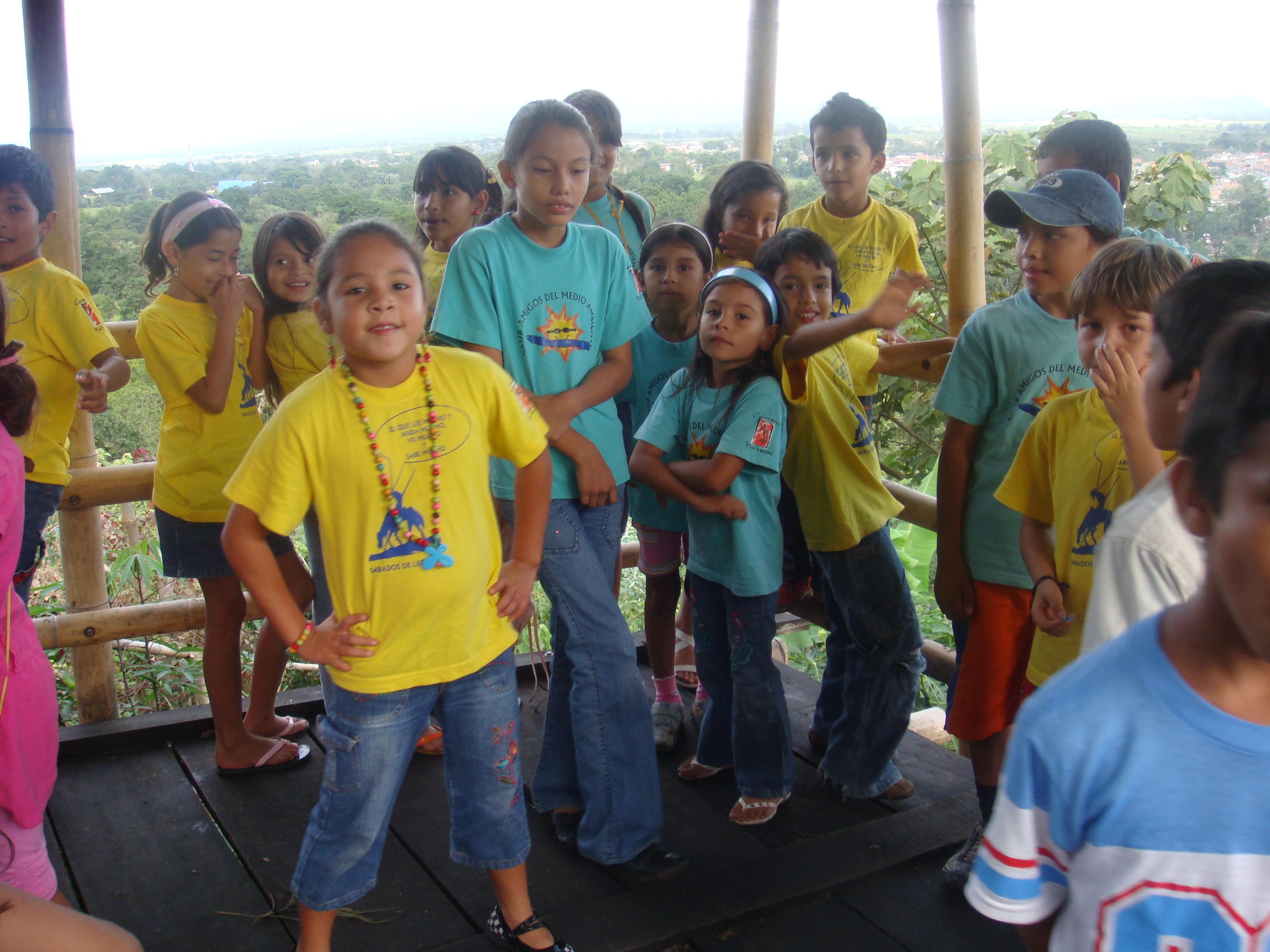
Children in Ibagué, Colombia, 2008
Is your life private?
The other country we visited and in which we had to arrange for an armed escort is Colombia. At the time (2008) it was the country with the most internally displaced persons (IDPs)—although this is not a competition anyone wishes to enter—and it was far more complicated than depicted in the media. There were (and still are in some places) rebels, paramilitary and armed security guards around oil depots as the nation sought renewed investments in its oil industry, despite ongoing guerrilla activity.
It was amazing to think we were in coca-growing country, and then we heard the stories. There were anecdotes of rebels snooping around houses at night, listening to conversations and looking for young people to enlist as soldiers. And we heard about towns completely cut off by land mines. The authorities had systems in place to handle IDPs, but they were overwhelmed.
So, to address the situation, enterprising local groups were setting up training programmes to educate people on their rights and to empower them.
One woman I talked to about the training project said: “The project has been vital for my leadership qualities, my strength as a person and my direction in life. All the training I received in the project has helped me to be proud of being displaced, rather than ashamed, and therefore justly proud of all that I have managed to achieve”.
Temporary vs long term
In Lebanon in the early 2000s we were funding projects to support Palestinian refugees—the majority had been refugees all their lives. Like many, they had had their identity and their homeland taken from them, so they clung to their culture and sense of identity.
This changed after the Syrian conflict began and we started funding a project for Syrian and Syrian–Palestinian children.
The sad irony of the situation reminds me of a conversation I had with a Palestinian community worker on a visit before the Syrian conflict. She was very excited about an upcoming weekend visit to Syria, and said, “Life is so much better for Palestinians in Syria”. That soon changed and it highlights the seesaw of emotions that displaced people suffer when a sense of freedom proves false and is dashed.
In nearby Jordan we visited Zaatari refugee camp, described as the fourth-largest town in Jordan. It is a huge, dusty place that does not seem conducive to making a community, yet the central area is full of shops providing all kinds of items and services, such as take-away pizza. There is even a wedding dress shop. Choosing to get married in style is a freedom that could not be taken away.
Is this independence?
A year after South Sudan gained independence in July 2011, we were able to visit the capital, Juba. The city was a large non-governmental organisation (NGO) commune, almost completely run by aid agencies. They provided jobs as well as services, which had collapsed almost completely during the long civil war. There were few local businesses, so the international agencies and NGOs were providing the required services.
Most of the local residents were living in small communities on the edge of the city, where the women were conducting small income-generating activities while caring for the children. The women have so much more responsibility—not just as caregivers for the family, but as care providers and protectors in the community.
Many people in Sri Lanka, as in Colombia, have experienced long-term internal displacement, together with the attendant lack of freedom despite being in their own country. On one of our visits we were stopped and checked by a young soldier carrying a Kalashnikov rifle. As I stepped out of the car, I was pulled back from the grass where there were warning signs about land mines. How must it feel, I wondered, to be controlled by soldiers the same age as your children, and be afraid to walk around your own home?
Yet, I witnessed the usual resilience and determination needed to overcome these obstacles when I sat in on a therapy session provided by a local women’s group. It was amazing. I came away thinking that there are three important factors in emotional recovery: to share, to cry, to laugh.
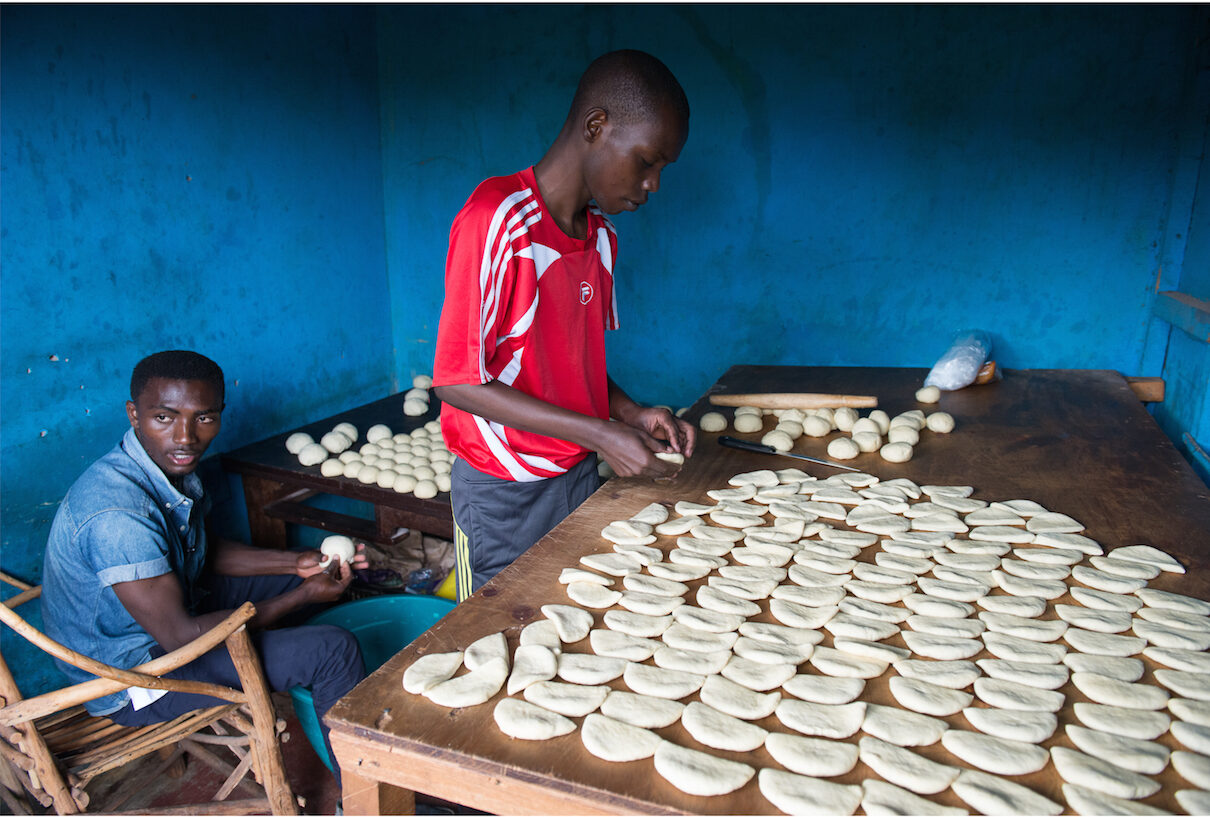
REI alumni running their own business making mandazi, a form of fried bread.
Camp freedom or urban freedom?
In many countries people may choose to leave the so-called safety of a refugee camp to seek more freedom living in the city. In camps, some facilities are provided by aid agencies, but the residents can choose neither where to live in the camp nor where to seek work. So one must ask, is it really easier in the city when one is without documents and the right to local services?
In Nairobi there are refugees from a number of countries: Rwanda, the Democratic Republic of the Congo, Burundi, Somalia, Eritrea and Ethiopia. The groups have problems integrating, and protection issues are more difficult in urban areas, where police will take it upon themselves to arrest refugees at will and detain them.
We met an amazing legal aid organisation that represents refugees who have been illegally detained and educates them about their rights. Through an entrepreneur training scheme supported by REI, alumni have gone on to start their own business or find work that enables them to provide for themselves and their families.
Habimana from Rwanda told me, “Now I can send my son to school and I no longer have to ask neighbours to lend me money”. He is not asking for much, but it has restored his dignity.
On the Thai–Myanmar border, many refugees have lived in camps for up to 30 years. While some have chosen to take up resettlement under a scheme promoted by the UN, others have chosen not to. One woman told me she wanted to stay. She explained why: “So my daughters understand what our people have experienced, and they will grow up strong and able to give back to our people”.
Recently the camps have been in lock-down due to an increase in Covid-19 infections in Thailand. Yet, the project work has continued, showing how alumni have been empowered to keep going. One contact even wrote to me this week to apologise for the project delay! For refugees, it was just one more challenge that had to be faced.
We think this could not happen to us but, as we write, we are reminded that it could happen to our neighbours and that history continues to repeat itself. As each new crisis occurs, the forgotten millions continue to be forgotten and more join them in the struggle to be normal.
We have been fortunate to be able to tell many of these stories over the years through BCCJ ACUMEN, a publication that has served the British Chamber of Commerce in Japan’s community and members well. We continue to enjoy the excellent support of Custom Media, one of our main sponsors. The Custom Media team are superb. Professional and helpful, they are always ready to assist wherever possible.
